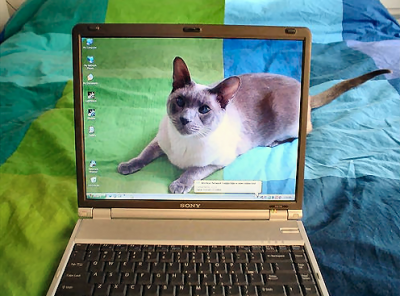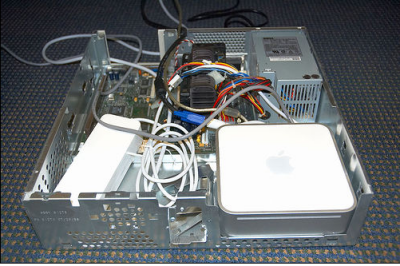I, like a lot of people, buy stuff via the Internet as
well as from local stores. When I'm shopping online, weighing
on my decision as to what site to buy from includes, but is
not necessarily limited to, availability of what I want, at a
price I am willing to pay, from a place that I trust.
The first factor is easy. Either they have what I want or
they don't. If they have it, they pass the first hurdle.
The second test is a little harder. Usually, I'm shopping
for the lowest price. But not always. If the lowest price is
from a place I don't trust, I'll start going up in price
until I find a place that I do trust.
The third factor, trust, is where things can get dicey.
Why? Because I have to give my name, address, phone number,
and credit card information to an entity that, in many cases,
exists only online (i.e., they don't have a retail store
where you can go to buy the item). For all I know, the
website could be a front for the Russian mafia and they are
just collecting this information so they can steal my
identity.
In economic terms, there exists the problem of asymmetric
information. I would be giving much information to them but I
don't have any information about them. Typically, when this
occurs, the trade (i.e., the sale) does not happen.
Internet sales are not unique in this situation. For
example, most of us don't know how to grade beef. I mean, one
cut of steak looks pretty much like the next one. As one way
of solving the information problem, we have a government
agency (in the US it's called the USDA) to
create and enforce safety and quality standards. So, the
theory goes, if I walk into a Alpha Beta grocery market and
see a USDA grade
"prime" beef steak, I should have a reasonable
expectation that it meets certain minimum standards. If I
then decide to go next door to Ralph's Market, and see
another steak, also graded USDA prime, but costing five
percent less per pound, I would have a reasonable expectation
that the two steaks would have similar characteristics and
that I can then buy based on price (If I didn't have a
trusted third-party to consult, what I was willing to pay
would probably do down, perhaps to not buying at all, and
would lead to economic inefficiencies.).
The main point of this is we need a way to get information
that can be used by us to determine whether to trade and, if
so, at what price. If we don't get the information, the
tendency is either not to trade or to lower the price we are
willing to pay (to allow for the possibility that what we are
getting is worth less than what the seller is saying it is).
Asymmetrical information is also at work when you buy a car,
get a bank loan, or buy a house.
Hence, the use of a trusted third-party, whether public or
private, who has information that I need, is one way of
creating a situation where a trade can occur. For me, that
trusted third-party is usually the Better Business Bureau. While
the BBB is funded through business membership dues, it
functions, if it functions at all, only when it remains
neutral in disputes between businesses and customers. If that
neutrality is ever brought into question, the BBB could lose
it most valuable asset, the trust of customers. Without this
trust, many trades would not otherwise occur or occur only at
much lower rates.
So, it's surprising to me just how many Internet-based
companies either aren't members of the BBB or refuse to work
with the them when disputes with customers arise. Note here
that the mere fact that there are business/customer disputes
is not necessarily an indicator of a bad business. Especially
if they resolve all of these disputes to the satisfaction of
the customer/BBB. But I digress.
Back to a current example. I've been thinking about
replacing the stock Intel supplied CPU cooling fan on SWMBO's
PC (Prescott, 2.8E). This fan is way too small for the heat
that is coming off the CPU and Intel should be ashamed to
have mis-designed it. I've already added two 80mm case fans
in addition to the existing 120mm and power supply fans but
it's just not enough to keep the CPU fan from spinning at its
highest speed as it vainly tries to cool the over heating
core. The sound of that fan is truly irritating, even though
she has the case under the desk she uses.
Recently, I decided enough was enough and it was time to
find a solution. My search narrowed down to the
Zalman CNP S7700-AlCu and the
Thermalright XP-120. I chose the Thermalright based on
its lower weight (the Zalman exceeds the Intel motherboard
limit of 450 grams by weighing 600 grams) and reviews. But
when I started looking for sites where I could buy one, I was
stymied by either it not being in stock, the business had an
unsatisfactory rating from the BBB, or they had it in stock
and had a satisfactory BBB rating but were selling for $20
more than other sites (about $67 USD vs. $47).
I am in a quandary. Do I pay the $20 premium, keep
looking, go with the Zalman instead, or just forget about it
and don't buy anything? I haven't decided yet. How you decide
to buy stuff may be different from me. But if you can't trust
the business to adhere to simple business ethics and sell at
a fair price, would you (should you?) give your financial
information to them? You decide. YMMV.
Have a Great Weekend, Everyone -
Aloha!













